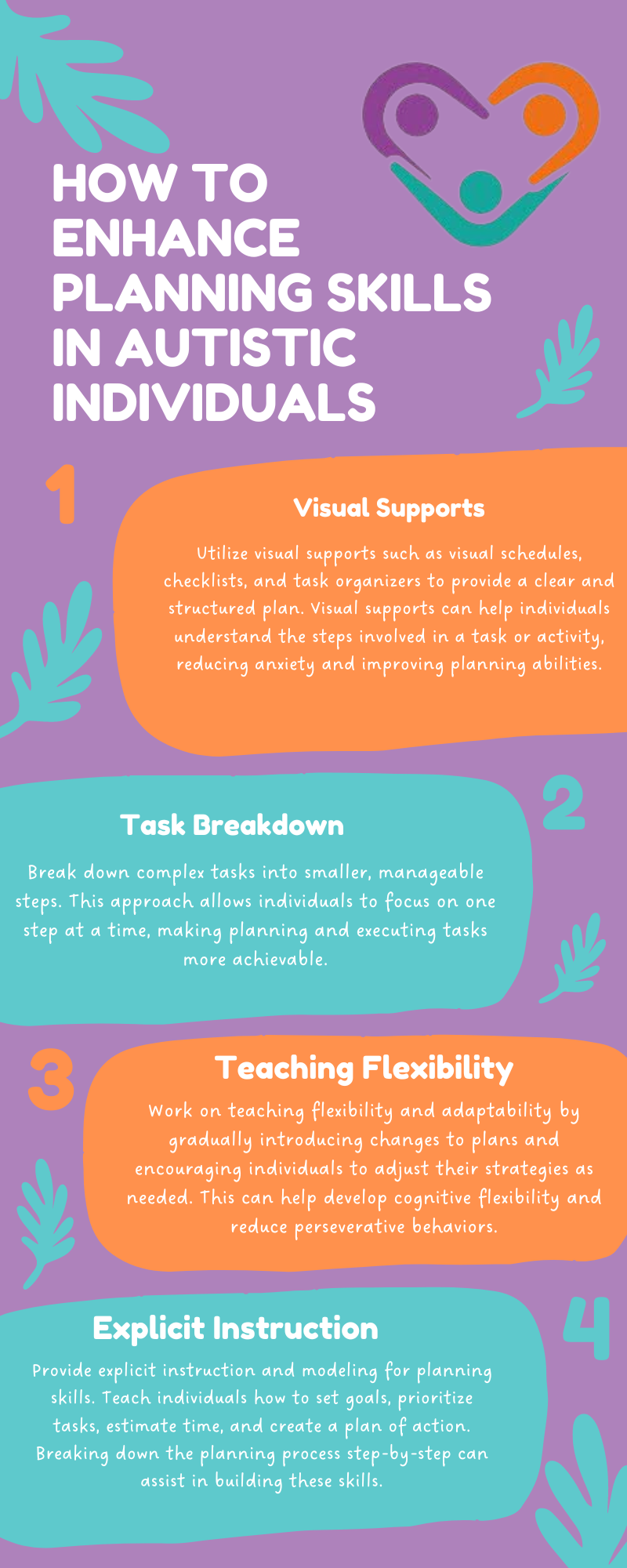Executive dysfunction is a cognitive impairment that affects various aspects of an individual’s ability to plan, organize, and regulate their thoughts and actions. It is particularly relevant in the context of autism spectrum disorder, where individuals often experience challenges in social interaction, communication, and restricted interests.
In this article, we’ll look at what executive dysfunction is all about and its impact on autistic individuals.
What is Autism Executive Dysfunction?
Executive function refers to a set of cognitive processes that enable individuals to engage in goal-directed behavior, make decisions, and adapt to changing situations.
This umbrella term encompasses functions such as planning and working memory, as well as the initiation and monitoring of actions.
In the case of individuals with autism, executive dysfunction can manifest in various ways. Difficulties with planning, organizing tasks, and problem-solving are common. Working memory, which involves holding information in mind and manipulating it, may be impaired.
Additionally, challenges with impulse control and inhibition can affect social interactions and result in impulsive behaviors.
The implications of executive dysfunction can be far-reaching, impacting academic performance, daily routines, and social interactions. Difficulties with organization and planning can hinder the completion of tasks, leading to frustration and decreased productivity.
Impulse control issues can contribute to impulsivity and difficulties in social settings. Moreover, autistic individuals may struggle to adapt to changes in routine or shift their attention from one task to another.
Impact on Autistic Individuals
Executive dysfunction is particularly prevalent in individuals with autism. The frontal lobe, known as the seat of cognition, plays a crucial role in neuropsychological functioning and regulating higher-order cognitive functions related to executive functions.
Any developmental delay affecting this area typically results in executive dysfunction.
The primacy of executive dysfunction in autism is a topic of much debate within the scientific community. Researchers are exploring subtypes of executive function within autism and other neurodevelopmental disorders that implicate frontal lobe function.
By understanding the impact of executive dysfunction on individuals with autism, we can develop targeted strategies and interventions that support their cognitive and behavioral needs.

Key Subdomains Executive Function
To better understand executive dysfunction in autism, it is important to explore the key subdomains of executive function that are commonly affected. These subdomains include inhibition and impulse control, working memory and flexibility, and planning and monitoring.
Let’s explore each of them in further detail.
Inhibition and Impulse Control
Inhibition refers to the ability to stop an impulse or behavior. Autistic individuals may experience challenges in inhibitory control, making it difficult for them to regulate their responses in various situations.
Research has shown that some autistic children struggle with responding to go/no-go tasks and inhibiting prepotent responses. These difficulties in inhibition and impulse control can manifest in impulsive behaviors or difficulties in resisting immediate urges.
Working Memory and Flexibility
Working memory is the ability to hold and manipulate information in the mind over short periods of time. Flexibility, on the other hand, refers to the ability to shift thoughts or actions according to the demands of the situation.
Autistic individuals may exhibit poor working memory and cognitive flexibility, which can affect learning and problem-solving abilities.
Difficulties with working memory and flexibility can lead to perseveration, where individuals get stuck on a particular thought, behavior, or action. This repetitive behavior can interfere with their ability to adapt to new situations or adjust their responses accordingly.
Autistic individuals may also struggle with regulating motor behaviors due to poor cognitive flexibility, which can further impact their everyday functioning.
Planning and Monitoring
Planning involves the ability to formulate and organize a series of steps to achieve a goal. Monitoring, on the other hand, refers to the capacity to assess one’s progress and make adjustments as needed. Autistic individuals may experience challenges in planning and monitoring, particularly in complex tasks that require multiple steps or contingencies.
Everyday planning and readjustment to plans can be particularly challenging for autistic individuals. These difficulties in planning and monitoring may stem from underlying learning disabilities or executive dysfunction.
It is important for parents and caregivers to provide support and strategies to help individuals with autism develop and enhance their planning skills.

The Frontal Lobe Connection
The frontal lobe is responsible for regulating higher-order cognitive functions related to executive functions. These functions include planning, working memory, impulse control, inhibition, mental flexibility, as well as the initiation and monitoring of actions.
When the frontal lobe is affected by developmental delays or abnormalities, it can lead to executive dysfunction.
The various challenges of autism in everyday life such as difficulties in social interaction, communication, restricted interests, and repetitive behaviors can be attributed, at least in part, to executive dysfunction. The impaired ability to plan, shift attention, inhibit responses, and adapt to changes can significantly impact daily functioning and overall quality of life.
Research suggests that individuals with autism often experience developmental delays in the frontal lobe which can contribute to executive dysfunction. Structural studies have shown certain abnormalities in the autistic brain, including transient delayed postnatal maturation of the frontal lobes.
These delays in the development of the frontal lobe can disrupt the normal functioning of executive processes. This leads to difficulties in cognitive flexibility, impulse control, and other executive functions.
Additionally, serotonergic abnormalities have been observed in the prefrontal cortex of individuals with autism. The prefrontal cortex is a region of the frontal lobe involved in executive functions.
These serotonergic alterations may further contribute to the executive dysfunction seen in individuals with autism.
Strategies and Support
Fortunately, there are appropriate strategies and support that can be implemented to make a significant difference in the daily lives of autistic individuals.
For many autistic individuals, inhibition, the ability to stop an impulse or behavior, can be particularly challenging. Difficulties in responding to go/no-go tasks and inhibiting prepotent responses have been observed, indicating struggles with inhibitory control in autism.
Here are some strategies that can be helpful to support individuals with inhibition challenges:
- Visual Cues: Utilize visual cues and prompts to reinforce appropriate behaviors and remind individuals when to inhibit impulsive actions.
- Social Stories: Create social stories or visual narratives that specifically address inhibition challenges and provide guidance on appropriate responses in various situations.
- Structured Environment: Establish a structured environment with consistent routines and clear expectations. This can help individuals develop self-regulation skills and reduce impulsive behaviors.
- Positive Reinforcement: Implement a system of positive reinforcement to reward and encourage appropriate inhibitory behaviors. This can be in the form of verbal praise, tokens, or small rewards.
Planning difficulties are another common aspect of executive dysfunction in autism. While planning skills can vary across individuals, challenges often arise in complex planning tasks. Everyday planning and readjustment to plans can be particularly challenging for autistic individuals, potentially due to underlying learning disabilities.
To enhance planning skills in individuals with autism, consider the following strategies:

In summary, understanding autism executive dysfunction is key to supporting autistic individuals effectively. When we recognize how challenges with planning, organization, and self-control can affect daily life, we can better tailor our support and strategies.
Embracing these insights not only promotes a more inclusive society but also empowers individuals to overcome obstacles and reach their full potential. For those seeking support, exploring ABA services in New Jersey, Georgia, Indiana, and New York can be a valuable step. Contact Golden Care Therapy to learn more about how our dedicated team can assist you in your journey. Reach out to us today to get started!



